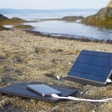
In research by comScore, it revealed that smartphone ownership will continue to rise in the coming years. In fact, there will be more mobile device owners than Internet users, with an expected 300 million plus handsets in the world by 2017 from 198.5 million today.
But it's not only mobile device ownership that will rise, as demand for better and more tech-advanced smartphones will also increase next year. Updated versions of today's handsets are already expected, but there are particular features we hope to see in the next wave of smartphones. Read on below to find out some of the new technology that you can expect to be featured on smartphones in 2017.
Standard 8 GB RAM
While mobile users are now enjoying 3GB RAM, there is a big change expected next year. Experts predict that the 3GB and 4GB RAM will soon be replaced by the more powerful 8GB power. Samsung has introduced the first 8GB low power double data rate 4 DRAM that offers high-end performance with power consumption efficiency. It is expected to be a built-in feature on future ultra-slim and high-powered smartphones. With such power, future mobile devices will be able to offer PC-level premium features. Samsung plans to incorporate the technology inside its forthcoming Galaxy S8 that is said to have 4K video streaming and virtual reality as its primary features.
Iris scanner
Biometric sensors are an effective security technology. From the face recognition tech featured by first generation Android devices to the fingerprint scanners on the current ranges on the market, these will soon be upgraded to more secure sensors by next year. The iris sensor is expected to be a common feature across all smartphones by 2017. Although there are already handsets on the market that have this feature, big brands will soon be adopting the technology. Apple, LG, and Samsung have been reported to be working on implementing a built-in iris scanner across all their platforms to offer users added security. The technology is expected not only to arrive on premium devices but also on low-range smartphones as new iris scanner technology was found to be less costly to producing other forms of biometric scanners.
No more headphone jack
While many criticize Apple's move to take out the 3.5mm headphone jack, the new iPhone has proven to be a competitive smartphone due to the update. After 17 days on the market, the iPhone 7 already accounted for 43% of the company's third quarter sales for 2016. Experts said that the improved technology and new design (without the headphone jack) makes the handset "unparalleled and a cut above anything else in the industry." They have introduced EarPods that are connected to the lightning connector port and a new stereo speaker system. O2 said that the iPhone 7 is now two times louder than its predecessor, offering a better audio experience for users. It is forecasted that the next wave of smartphones will follow this trend and start introducing their own lines of mobile devices without a headphone jack.
Augmented reality
AR has been receiving plenty of praise lately and experts foresee that the technology will soon be arriving on smartphones as a built-in feature, especially on premium handsets. The increasing demand for high-tech, quick, and relevant information will force mobile producers to include augmented reality on its camera feature. However, the worrying factor is the limited recognition accuracy. In order for it to work seamlessly, the technology must be of a certain standard so that it doesn't interfere with other AR images, especially in public. The AR industry will be worth $117.40 billion by 2020, topping virtual reality market expectations at $33.90 billion.
An exciting year awaits mobile device users in 2017, as there are plenty of new technologies that will arrive on the next wave of smartphones. Are there any new technologies you hope to see next year on mobile devices?



